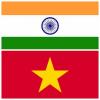Dynamics Demystified: India-Bangladesh Relations
According to Thomas Homer-Dixon, water will be the major source of conflict in the upcoming time. The contemporary scenario represents somewhat the same picture. Present era is marked with various kinds of conflicts where resource sharing between the nations is a big issue of contemplation, which further leads to disagreement. The conflict often arises due to unequal distribution of resources or from a dependency-led need for more resources often at the expense of neighboring states.




